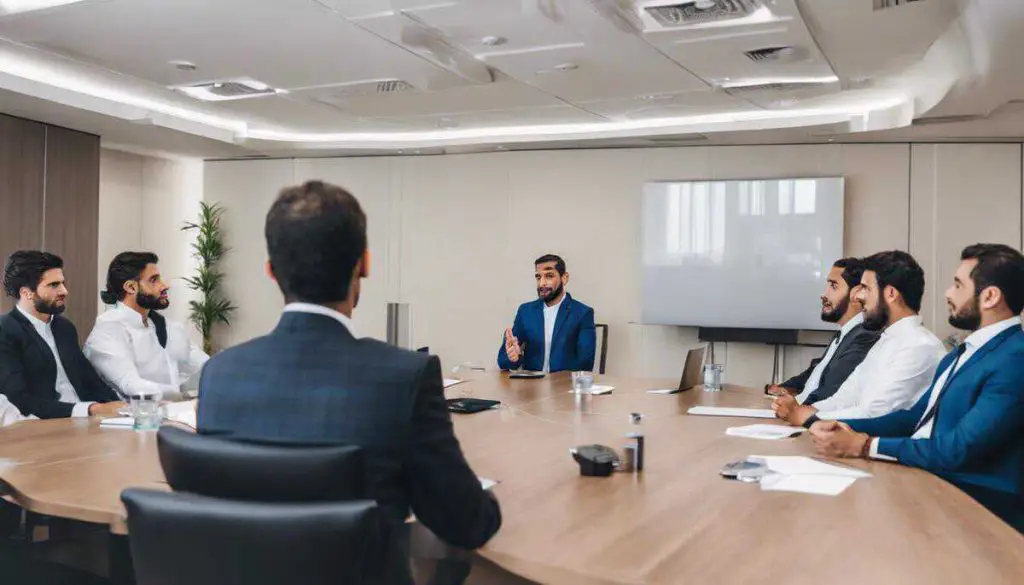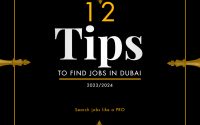13 Tips for Acing Interview in UAE/GCC Countries
Stepping into a job interview can often feel like navigating through a maze, where each turn presents its own set of challenges and opportunities. The key to finding your way lies in preparing yourself with the right knowledge and mindset. A clear and confident approach solves many issues,

1. Researching the Company
When preparing for a job interview in the UAE, taking the time to research the company you’re applying to is a fundamental step that should never be overlooked, whenever you start reading about the company, it unfolds many questions, explore their website to understand their mission, vision, and values. Look for their latest news, projects, and achievements to gain insight into their current focus and future direction, this is very important as you can pitch this in your interview to make a good impact.
Moreover, search on social media about the company and explore the reviews section If possible, reach out to current or former employees through professional networks like LinkedIn to gain insights into the work environment and expectations. This understanding can significantly impact the conversation during your interview, allowing you to ask informed questions and demonstrate genuine interest in being part of their team.
2. Understanding Cultural Norms:
Adapting to the cultural environment of the UAE is very important for your job interview. UAE/GCC region is rich in traditions and values that are deeply embedded in its society, influencing business conduct and interpersonal interactions. Knowledge of these cultures and traditions makes a positive impact
Greetings are an important aspect of UAE culture, often marked by longer handshakes and the use of formal titles with polite tones shows patience and waiting for the other person to initiate the handshake, especially if they are of the opposite sex, as some individuals may prefer not to engage in physical contact for religious reasons. Acknowledging these signs showcases your respect for personal boundaries and cultural practices.
The dress code is an area that shows cultural sensitivity is present. Professional business attire to pay homage to the local customs. Men should lean towards suits in subtle/simple colors, while women should ensure their outfits cover the shoulders, knees, and chest area, avoiding tight-fitting clothes.
Language plays a part too. While English is widely used in business settings Arabic language is preferred and it is very easy to learn a few words in Arabic that can be used such as “As-salaam alaykum” (Peace be upon you) as a greeting or “Shukran” (Thank you) to express gratitude can be seen as a gesture of appreciation towards the local culture. But it is important to use them correctly, especially in your interview.

3. Dressing Appropriately
It is very crucial to dress appropriately, your attire can speak volumes before you even say a word. Choosing conservative and modest clothing is not merely a suggestion; it’s a crucial part of preparing for a successful job interview. This gesture shows that you understand the social fabric of the region.
Accessories should be chosen with care. Avoid anything too fancy that might distract you. Subtlety is key. Simple watches or jewelry can add a touch of professionalism without overstatement you won’t be wearing a long chain which the Interviewer can see easily, clothes should be neat and clean no stains should be present and shoes should be polished
By Understanding these principles in your interview attire, you prepare to make a great first impression and embark on a journey of mutual respect and understanding in your new professional setting. A signal of professionalism would lead it way to the interviewer.
4. Timeliness is key:
Punctuality is Key, it has been observed people arrive late in their first interview session, this is a red flag no matter how genuine your issue is but you need to be prepared in advance whether it is an online or physical interview punctuality stands as an testament to your respect for the process, the people you are meeting, and their time. It’s not merely about being on time but about demonstrating your commitment and placing a high value on the opportunity in front of you.
Arriving early provides you with the chance to catch your breath, compose your thoughts, get familiarized with the environment, and mentally prepare for the dialogue ahead. Rushing can only add stress and anxiety, which you certainly do not want moments before an interview.
Consider the impression you wish to leave. Even without words, you tell your potential employers about respect for time and that you value their time as much as yours. In cultures where relationships and perceptions significantly impact decision-making, maintaining punctuality can tip the scales in your favor.
Observation is the key here, reaching early at your interview destination, you can take subtle cues from the interactions among employees, their demeanor, and the general atmosphere. This ambient knowledge could provide valuable context about the company culture, enriching your understanding and possibly influencing your responses and questions during the interview.
5. Preparing Your Documents
Navigating through a job interview requires more than just not being late and dressed appropriately. For a successful interview, you need to equip yourself with the right documents. Think of these papers as your passport and visa in the professional setting, ensuring your documents are organized and ready demonstrates thoroughness and attention to detail, as these traits resonate strongly within the UAE work culture.
Your resume is a key document. It should not just outline your work history and educational background, but it should highlight your experience in a very professional manner you can read our guide to craft a perfect resume here. Audiences in the UAE, like anywhere, appreciate a document that’s easy to follow, factually correct, free from error and spelling mistakes, up-to-date, and reflective of not just what you’ve done, but how you’ve excelled.
Accompanying key references plays a vital role, yet they can tip the scale in your favor. Choose references who can vouch for your accomplishments Remember to give these individuals a heads up—they may be contacted and you’ll want them to be prepared to praise you a lot but professionally and make sure they are not made up.
Achievements, certifications, or portfolios showcasing your work are not just additional papers; they are tangible evidence of your expertise and commitment. Bring along anything that can demonstrate not just your proficiency but also your unique approach to solving problems or enhancing productivity is key but it needs to be done professionally, it doesn’t have to look like you are overselling
6. Practice Patience
In the fast-paced environment of UAE and its multi-faceted work culture, patience is not just a virtue, it’s an essential skill that can heavily influence the impression you leave during a job interview process. With patience, you can understand the local business environment and how actually things work, especially in the face of unforeseen delays or extended waiting periods,
Why is patience so crucial? In the UAE, the pace at which decisions are made can vary at times we have seen you apply for a job and everything went smoothly but still, you failed to land the job at that time but given an opportunity later in your career so you never know which thing will work out of you in future all you had to do is give your best shot.
Imagine you’re in the waiting room, moments or even longer before your scheduled interview. Use this time as an opportunity, not a challenge. Reflect on how this moment exemplifies the importance of saber (patience in Arabic). By embracing this waiting period with grace and positivity, you exhibit an understanding of and respect for—the cultural nuances that influence business practices in the region.
7. First Impression
Your initial interaction and speaking during a job interview in the UAE/GCC sets the tone and provides an opportunity to make a strong impression. Mastering the introduction in a polite /gentle tone reflects your cultural awareness adaptability and respect for the region.
A proper greeting involves body language, eye contact, and the use of formal titles. In the UAE/GCC region, longer handshakes are common and symbolize warmth and hospitality. Always use the right hand for handshakes and passing documents, as it is considered respectful.
Be aware of alternative greetings. There are situations where a handshake might not be culturally suitable, placing your right hand over your heart can convey respect.
Using formal titles during your introduction until invited to do otherwise reflects your professionalism and honors hierarchical nuances. Addressing your interviewer as “Mr.,” or “Ms.,” or using their professional title followed by their last name gives a good balance.
Make sure you are always maintaining eye contact with proper facial expression which shows your confidence and sincerity. However, always need to ensure that the respect quotient is always there.
8. Engaging Actively in the Conversation
Candidates must ensure that they are having an engaging conversation, not a typical Question asking series. This means showing genuine interest, understanding, and thoughtfulness in every aspect of the dialogue.
Active listening is important for meaningful interaction. Show that you’re tuned in by:
- Nodding where appropriate
- Maintaining eye contact
- Appropriate facial expression
- Displaying open body language
Active listening also involves processing the interviewer’s words and responding in a manner that shows your approach to the role and alignment with the company’s values and goals. Be present, mentally and emotionally, ready to catch nuances that can guide your responses and questions.
Asking relevant questions about the role, team, corporate culture, and future projects conveys your professional approach gives confidence to the interviewer, and also gives you critical information to weigh your interest and fit. You can craft these questions based on your research.
Make sure your conversation is filled with politeness and gratitude which speaks loudly of your character. Acknowledge the opportunity, show appreciation for the interviewer’s time, and convey your eagerness to contribute constructively.
In the competitive job market of the UAE/GCC, adopting these aspects of engagement can distinguish you as a thoughtful, interested, and proactive potential candidate. Your ability to effectively engage and remain in the conversation shows your ability to not give up.
9. Answering Questions Concisely
Job interview environment can make you nervous in no time, the ability to communicate clearly and concisely sets you apart. Providing the point answer with enough details and making sure not to beat about the bush is the key to making your impression long-lasting.
Focus is the key start by actively listening to the question, ensuring you fully understand what’s being asked before you begin your response. A thoughtful pause is a good way to begin your answer and it can significantly improve the clarity and relevance of your answer.
- Structure your response like a compelling story with a clear beginning, middle, and end:
- Start with a direct answer
- Delve into a concise example that illustrates your point
- Wrap it up with a summary that ties back to the question
This technique keeps you on track and makes it easier for the interviewer to understand as well.
Be mindful of the language you use. Simplify your language be professional and avoid any jargon This demonstrates an awareness of and sensitivity to the listener’s needs, especially where the competition is extremely tough
10. Asking Relevant Questions
The questions you ask in an interview can be as revealing and important as the answers you provide. They serve a dual purpose having information about the role and what the company wants from the job seeker, there may be at some point you feel that this is not the right job for you, so it is very crucial to ask relevant important questions about the company and overall job itself.
Consider asking about the team you’ll be working with. Inquiries such as “Can you tell me about the team I’ll be part of?” “How many Members are there” or “How does this role interact with other departments?’’ “What kind of Support’ll be getting from another department” offers insights into the company’s structure and your potential place within it.
Probe the interviewer about potential challenges in the role. Questions like “What challenges have someone in this position previously faced?” or “What will be the immediate priorities?” disclose your forward-thinking approach and prepare you mentally for what lies ahead.
Inquiring about growth/reward opportunities within the company can demonstrate ambition and a long-term interest in growing with the company. You might ask, “How does the company support professional development?” or “What advancement opportunities typically arise for individuals in this role?”
Always feel confident in asking company’s vision and objective and then how can you align your goals with the goals of the company by asking about the company’s values and how they manifest within the workplace. A question such as “Can you give examples of projects or initiatives that reflect the company’s core values?” highlights your desire to align your ethics/goals with those of your prospective employer.
Preparing and asking well-crafted questions shows your interest, enthusiasm, and professionalism. It demonstrates that you’re not just looking for any job but you are serious about this job and ready to contribute, grow, and face the challenges it presents.
11. Understanding the Interview phases
Companies in the UAE/GCC regions often utilize various interview structures, each designed to test different skills and compatibility levels of candidates with the organizational culture and role requirements. It’s essential to inquire about this structure in advance which you are going to face when your Interview begins, typically these are the steps that a candidate faces, but every interview phase can be different.
- Interview Call/Phone Interview
- Written Test/Academic Knowledge Test/GK Test
- First Round interview
- Second Round Interview
- Panel Interview
Panel Interview
Panel interviews involve facing multiple interviewers simultaneously. Understanding that each panelist brings a different perspective and set of expectations allows you to address your answers in a way that appeals to everyone while demonstrating depth. Observing the dynamics between panel members can provide valuable insights into the company culture and hierarchy.

12. Following Up Graciously
In your job interview journey, consider the follow-up as a pivotal chapter that shows your professionalism and interest. In the fast-paced environment of the UAE/GCC, such gestures can act as a reminder of your eagerness and suitability for the role.
Even if there is negative feedback about your interview, you need to remain positive and try to enquire about what went wrong in a very professional way and then you can work on it.
13. Negotiating Final Offers:
Salary negotiation in the UAE/GCC requires a blend of thorough preparation, flexibility, and professionalism. Research should be your top priority regarding compensation packages for your role and also consider factors like cost of living, industry standards, and your experience level.
There may be a time employer can pitch a low salary by looking at the demand and supply but with an open mindset you can discuss this that why the offer is low you can wisely point out the reason
When articulating your expected salary, do so with confidence. Acknowledge your value while expressing eagerness to contribute to the company’s success and vision but you need to remember this is a final argument and it should be very polite and filled with humility, in short, give your best shot
Acing an interview is about demonstrating your genuine interest and alignment with the company’s culture values and goals without undermining your self. Being confident is the key here throughout the step.



